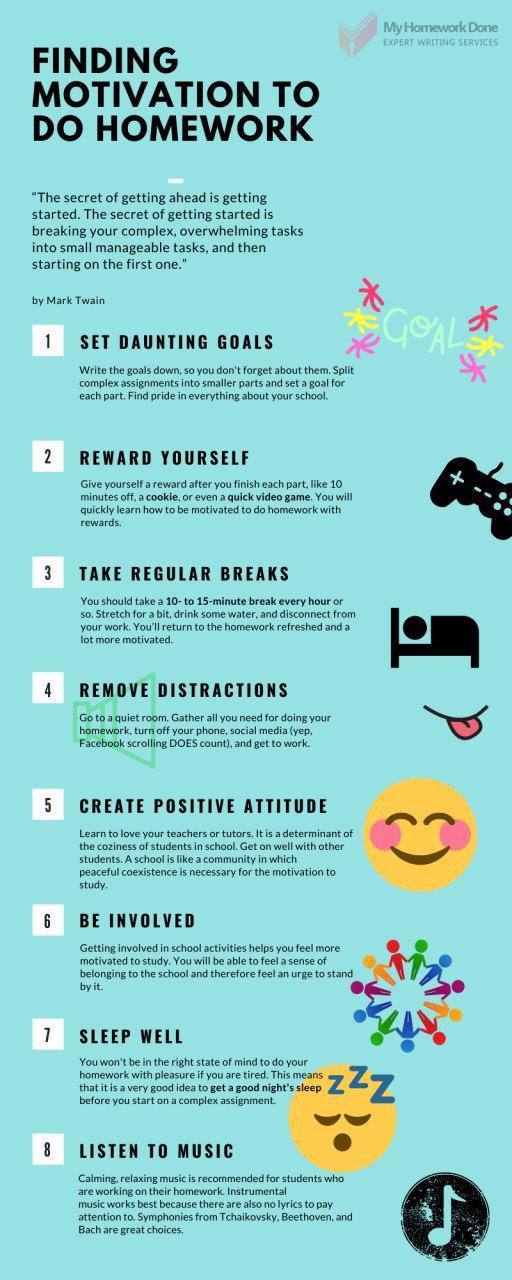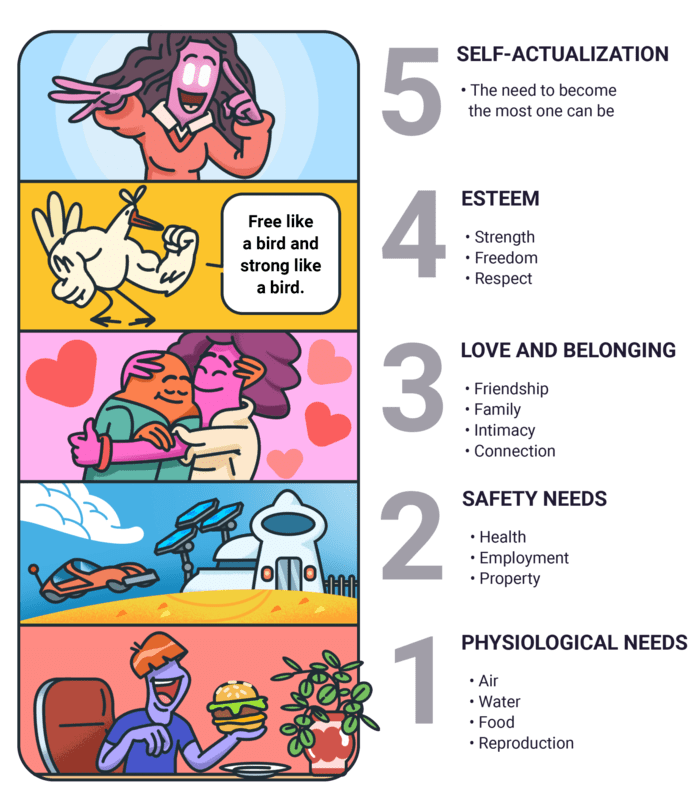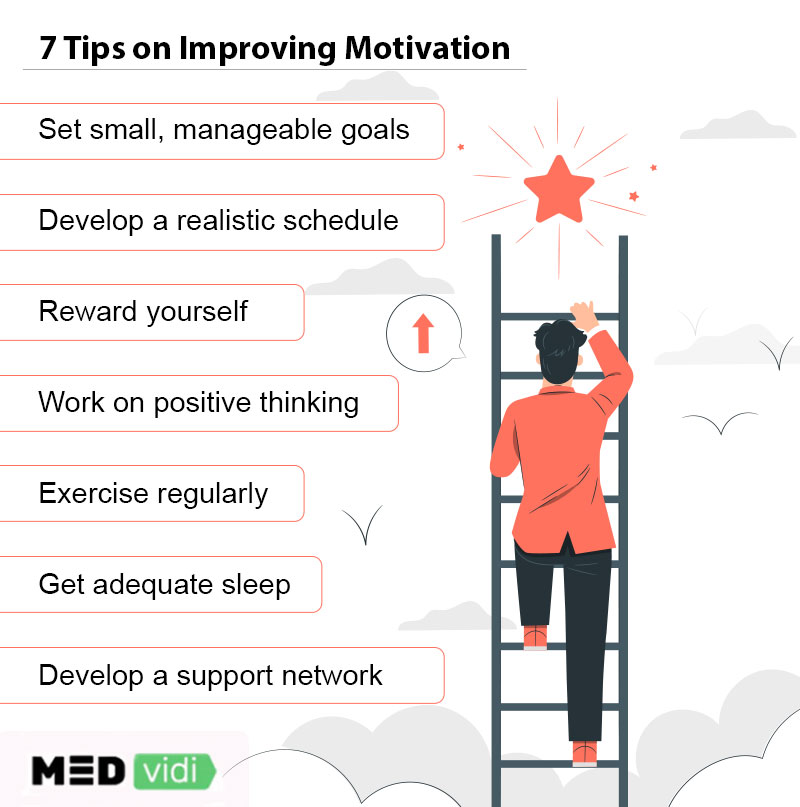To generate motivation, set clear goals and create a routine that includes small, achievable tasks. Motivation is essential for achieving goals and making progress in life.
Whether it’s in your personal or professional life, without motivation, it can be difficult to stay focused and accomplish what you set out to do. However, finding motivation isn’t always easy. It requires a conscious effort and strategies to keep yourself inspired and driven.
This article will explore effective ways to generate motivation by setting clear goals and creating a routine that includes small, achievable tasks. By implementing these strategies, you can boost your motivation levels and increase your chances of success. So, let’s dive in and discover how to generate motivation and stay on track towards your goals.

Credit: elearninginfographics.com
Understanding Motivation
Motivation is the driving force that propels individuals to take action and achieve their goals. It is the internal desire and determination to pursue and accomplish tasks. Motivation can be influenced by various factors such as personal needs, values, beliefs, and external stimuli. It is a complex psychological concept that plays a crucial role in shaping our behaviors and outcomes.
Motivation is a vital component in personal and professional success. It is the fuel that ignites the fire within us, fueling our productivity and determination. Without motivation, it can be challenging to overcome obstacles, stay focused, and achieve our desired outcomes. Whether you are striving to meet deadlines, conquer challenges, or pursue personal growth, motivation acts as the driving force that keeps you moving forward.
In today’s fast-paced world, where distractions are abundant and external pressures can weigh us down, understanding and harnessing motivation becomes even more crucial. By understanding the mechanisms behind motivation, you can learn to tap into your internal drive and generate the motivation needed to excel in various aspects of life.
Factors Affecting Motivation
When it comes to understanding motivation, it is essential to examine the factors that can significantly impact our drive and enthusiasm. Motivation is not solely dependent on our inner thoughts and desires but is also influenced by external factors that surround us. Both internal and external factors play a crucial role in determining our level of motivation and our ability to achieve our goals. In this section, we will explore the different factors that can affect motivation and how we can harness them to create a sense of drive and purpose in our lives.
Internal Factors
Our internal factors encompass the thoughts, emotions, and beliefs that can drive or hinder our motivation. These factors are deeply rooted within us and can significantly impact our ability to stay focused and driven. Some important internal factors to consider include:
- Self-belief: Our level of self-confidence and belief in our abilities can greatly influence our motivation. When we have a strong belief in ourselves and our capabilities, we are more likely to tackle challenges head-on and pursue our goals with determination.
- Attitude: A positive attitude can have a profound impact on our motivation. When we approach tasks and challenges with a positive mindset, we are more likely to stay motivated and persistently work towards our objectives.
- Goal setting: Setting clear and achievable goals can provide us with a sense of direction and purpose. When we have well-defined goals, our motivation is fueled by the desire to achieve those objectives.
- Intrinsic motivation: Intrinsic motivation refers to the internal drive that comes from within. When we are intrinsically motivated, we engage in activities because we find them personally fulfilling and enjoyable.
- Self-discipline: The ability to stay disciplined and remain focused on our tasks, even when faced with distractions or setbacks, is a crucial internal factor that impacts motivation. Developing self-discipline helps us stay on track and maintain our motivation levels.
External Factors
While our internal factors play a significant role in motivating us, external factors can also exert a considerable influence on our drive and enthusiasm. External factors refer to the influences and circumstances that are outside of our control but can impact our motivation. Some key external factors to consider include:
- Environment: The physical environment we find ourselves in can contribute to our motivation levels. A clean, organized, and inspiring environment can create a positive atmosphere that fuels our motivation.
- Support system: The presence of a strong support system, such as family, friends, or mentors, can have a profound impact on our motivation. Encouragement and assistance from others can provide us with the motivation to overcome challenges and achieve our goals.
- Rewards and recognition: External rewards, such as recognition or incentives, can serve as powerful motivators. When we feel that our efforts are acknowledged and rewarded, it boosts our motivation to continue working hard.
- Competition: Healthy competition can spark our motivation by pushing us to strive for excellence and outperform others. The desire to excel in a competitive environment can fuel our determination and drive.
- Opportunities for growth: Having access to opportunities for growth and development can inspire us to stay motivated. When we can see that our efforts will lead to personal or professional advancement, we are more likely to maintain our motivation levels.
Setting Meaningful Goals
Setting goals is an essential step in generating motivation. When you have something to strive for, it gives you a sense of purpose and direction. However, not all goals are created equal. Setting meaningful goals that align with your personal values is crucial for long-term motivation and fulfillment. In this section, we will explore how to identify your personal values and create SMART goals to ensure that your goals are not only achievable but also meaningful.
Identifying Personal Values
Identifying your personal values is the foundation for setting meaningful goals. Your values represent what is most important to you in life, guiding your actions and decisions. To identify your personal values:
- Reflect on your life experiences and consider what truly matters to you. Think about moments when you felt the most fulfilled and satisfied.
- Consider your core beliefs and principles. What do you stand for?
- Think about the qualities you admire in others. What values do they embody?
- Write down a list of keywords that resonate with you. These keywords should represent your personal values.
By identifying your personal values, you can align your goals with what truly matters to you, increasing your motivation and satisfaction in achieving them.
Creating Smart Goals
Once you have identified your personal values, it is essential to set goals that are Specific, Measurable, Achievable, Relevant, and Time-bound (SMART). SMART goals provide clarity and focus, increasing your chances of success. Here’s how to create SMART goals:
| SMART | Description |
|---|---|
| Specific | Clearly define what you want to accomplish. Avoid vague or general goals. |
| Measurable | Establish criteria to track your progress and determine when you have achieved your goal. |
| Achievable | Set goals that are realistic and attainable. Avoid setting goals that are too easy or impossible to reach. |
| Relevant | Ensure that your goal aligns with your values and long-term objectives. |
| Time-bound | Establish a deadline or timeline for your goal to create a sense of urgency and accountability. |
By creating SMART goals, you set yourself up for success by providing a clear roadmap to follow, making it easier to stay motivated and track your progress along the way.

Credit: clockify.me
Building A Supportive Environment
One of the key factors in generating motivation is having a supportive environment. Surrounding yourself with positive influences and creating accountability can greatly boost your motivation levels. By implementing these strategies, you can create a space that nourishes your motivation and propels you toward your goals.
Surrounding Yourself With Positive Influences
In order to stay motivated, it’s important to surround yourself with positive influences. This means seeking out individuals who inspire you and lift you up. Whether it’s friends, family members, mentors, or colleagues, surround yourself with people who share your goals and values. These positive influences can provide support, encouragement, and motivation when you need it most.
It’s also crucial to limit your exposure to negative influences. Negative people or situations can drain your energy and dampen your motivation. Evaluate the relationships and environments in your life and make a conscious effort to distance yourself from anything that brings you down.
Additionally, consider incorporating positive affirmations into your daily routine. Repeat uplifting and motivating statements to yourself regularly, helping to rewire your mindset and strengthen your self-belief. Use sticky notes, journaling, or smartphone reminders to keep these affirmations at the forefront of your mind.
Creating Accountability
An essential element in building a supportive environment is creating accountability. When you have someone or something holding you accountable, you are more likely to stay focused and motivated. Accountability can come in various forms, so find what works best for you.
One effective accountability strategy is to find a trusted accountability partner. This can be a friend, family member, or colleague who shares similar goals. Set regular check-ins or progress meetings to discuss your goals, actions, and challenges. This partnership will keep you accountable, provide support, and give you an opportunity to celebrate your accomplishments.
Another way to create accountability is by using technology. There are numerous goal-setting and habit-tracking apps available that can help you stay on track and monitor your progress. These apps often offer reminders, progress tracking, and even virtual rewards, providing both motivation and accountability.
| The Benefits of Creating Accountability |
|---|
| 1. Keeps you focused and motivated |
| 2. Provides support and encouragement |
| 3. Enables celebration of accomplishments |
Remember, being accountable to yourself is just as important as being accountable to others. Set clear goals, establish deadlines, and regularly evaluate your progress. This self-accountability will create a sense of responsibility and determination, driving your motivation even further.
Building a supportive environment is essential in generating motivation. By surrounding yourself with positive influences and creating accountability, you’ll be able to maintain your motivation levels and propel yourself toward success.
Developing Positive Habits
Developing positive habits is essential for generating motivation. When we incorporate productive and healthy behaviors into our daily routines, we set ourselves up for success. By identifying and breaking negative habits, as well as cultivating productive habits, we can create a positive mindset that fuels motivation to achieve our goals.
Identifying And Breaking Negative Habits
In order to develop positive habits, it is crucial to first identify and break negative ones. These negative habits can drain our energy and hinder our progress. Here are a few steps to help you identify and break negative habits:
- Self-reflection: Take a moment to reflect on your daily routines and habits. Are there any behaviors that are holding you back or causing you to feel demotivated? Identify these habits, whether it’s excessive procrastination, unhealthy eating patterns, or negativity.
- Set clear goals: Define your goals and what you hope to achieve. Having a clear vision of where you want to be will make it easier to identify habits that don’t align with your aspirations.
- Replace with positive alternatives: Once you’ve pinpointed the negative habits, focus on finding positive alternatives. For example, instead of mindlessly scrolling through social media, allocate that time for reading or learning a new skill.
- Take small steps: Breaking bad habits can be challenging, so it’s important to start small. Set achievable goals and gradually increase the difficulty. Celebrate your progress along the way to stay motivated.
- Stay consistent: Consistency is key when developing new habits. Create a daily routine that incorporates positive behaviors and stick to it. Over time, these habits will become second nature.
Cultivating Productive Habits
In addition to breaking negative habits, cultivating productive habits plays a vital role in generating motivation. Here are some effective strategies to help you cultivate productive habits:
- Create a morning routine: Start your day off on the right foot by establishing a morning routine. This could include exercising, meditating, or planning your day. A positive morning routine sets a productive tone for the rest of the day.
- Set priorities: Identify your most important tasks and prioritize them. By focusing on these tasks, you are more likely to accomplish them and feel a sense of achievement, which in turn boosts motivation.
- Manage time effectively: Organize your time and schedule your tasks. Break larger tasks into smaller, manageable chunks. This not only helps in staying organized but also prevents overwhelm and allows for better focus.
- Eliminate distractions: Avoid distractions that hinder your productivity. If social media or excessive internet browsing distracts you, consider using website blockers or implementing specific time blocks for leisure activities.
- Practice self-care: Take care of your physical and mental well-being. Make time for activities that relax and rejuvenate you, such as exercising, spending time in nature, or engaging in hobbies. When you feel good, you’re more motivated to tackle your tasks.
Maintaining Motivation
Looking for ways to stay motivated? Learn how to generate motivation and keep it going with these effective strategies. Discover tips and techniques to overcome challenges and maintain your drive towards achieving your goals.
Maintaining motivation is crucial in achieving our goals and dreams. However, it can sometimes be challenging to stay focused and driven. In this section, we will explore two effective strategies for maintaining motivation: rewarding yourself and tracking progress and celebrating milestones.Rewarding Yourself
Rewarding yourself is a powerful way to stay motivated on your journey. In the pursuit of your goals, it’s essential to acknowledge and celebrate your accomplishments, no matter how small they may seem. By incorporating rewards into your routine, you provide yourself with a positive reinforcement that can fuel your motivation and keep you going. Consider creating a rewards system based on milestones or tasks completed. For example, if you’re working on a project, set specific goals that, once achieved, warrant a reward. This could be anything that brings you joy, such as treating yourself to a favorite meal, buying a new book, or indulging in a relaxing self-care activity. By attaching these rewards to your achievements, you associate your hard work with pleasure, creating a positive feedback loop that sustains your motivation.Tracking Progress And Celebrating Milestones
Tracking your progress and celebrating milestones is key to maintaining motivation. It allows you to see how far you’ve come and encourages perseverance towards your end goal. Here are a few effective ways to track progress and celebrate milestones: 1. Keep a journal: Maintaining a journal or a progress tracker can help you record your achievements, setbacks, and lessons learned along the way. This not only provides a visual representation of your progress but also serves as a reminder of how much you’ve accomplished. 2. Create a milestone checklist: Breaking down your goals into smaller tasks and creating a checklist can help you track your progress more effectively. As you complete each task, mark it off your list, giving yourself a sense of accomplishment and motivation to move forward. 3. Share your achievements: Celebrate your milestones by sharing them with friends, family, or a supportive community. Their encouragement and recognition can boost your motivation and inspire you to continue working towards your goals. 4. Treat yourself to a celebratory activity: When you reach a significant milestone, treat yourself to a special activity or outing. It could be visiting a favorite place, attending an event, or enjoying an experience you’ve been looking forward to. This celebration serves as a well-deserved reward for your hard work and acts as a motivator to keep pushing forward. In conclusion, maintaining motivation requires consistent effort and conscious strategies. By rewarding yourself and tracking progress while celebrating milestones, you can stay motivated throughout your journey, increasing your chances of achieving your goals. Remember, motivation may ebb and flow, but with these practices in place, you can keep the flame of motivation burning bright.
Credit: medvidi.com
Frequently Asked Questions For How To Generate Motivation
How To Develop Motivation?
To develop motivation, set specific goals, break them into smaller tasks, and celebrate small successes. Surround yourself with positive people, eliminate distractions, and create a routine. Stay focused, track progress, and maintain a positive mindset. Practice self-care, visualize success, and stay determined to achieve your goals.
What Is The Cause Of Lack Of Motivation?
Motivation can be affected by various factors such as lack of clear goals, fear of failure, or feeling uninspired. It can also be influenced by external factors like a negative environment or lacking support. Identifying and addressing these issues can help improve motivation levels.
How Can Motivation Be Created?
Motivation can be created by setting clear goals, celebrating small achievements, seeking inspiration from others, breaking tasks into smaller manageable parts, and maintaining a positive mindset.
How Can I Train Myself To Be Motivated?
To train yourself to be motivated, set specific goals, break them down into smaller tasks, and reward yourself upon completion. Surround yourself with positive people and environment, and eliminate distractions. Stay organized, maintain a routine, and celebrate your progress. Continuously remind yourself of the end goal and stay focused.
Conclusion
Generating motivation is a crucial skill that can significantly impact personal and professional success. By understanding the underlying factors that drive motivation and employing effective techniques such as setting realistic goals, practicing self-care, and surrounding oneself with positive influences, individuals can unlock their full potential.
Remember, motivation is not a one-time achievement but a continuous process that requires nurturing. Embrace the power of motivation, and watch your life transform. Let your dreams become your reality!